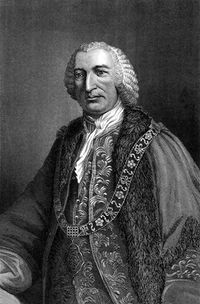Annotation:Beckford's Election: Difference between revisions
(Created page with "=='''Back to [[{{BASEPAGENAME}}]]'''== ---- <p><font face="garamond, serif" size="4"> '''BECKFORD'S ELECTION.''' English, Country Dance Tune (whole time). B Flat Major. Standa...") |
m (Text replacement - "garamond, serif" to "sans-serif") |
||
| (2 intermediate revisions by one other user not shown) | |||
| Line 1: | Line 1: | ||
=='''Back to [[{{BASEPAGENAME}}]]'''== | =='''Back to [[{{BASEPAGENAME}}]]'''== | ||
---- | ---- | ||
<p><font face=" | <p><font face="sans-serif" size="4"> | ||
'''BECKFORD'S ELECTION.''' English, Country Dance Tune (whole time). B Flat Major. Standard tuning (fiddle). AABBCC. | '''BECKFORD'S ELECTION.''' English, Country Dance Tune (whole time). B Flat Major. Standard tuning (fiddle). AABBCC. The title probably references the election of William Beckford [http://en.wikipedia.org/wiki/William_Beckford_%28politician%29] (1709–1770) to the office of Lord Mayor of London in 1769, he second election to the position (the first was in 1762). Beckford was born into Jamaican plantocracy but spent most of his adult life in London serving in various political offices, rising to become a crusading Lord Mayor who even defied King George III. | ||
[[File:beckford.jpg|200px|thumb|left|William Beckford]] He was also reputed to have been the wealthiest man in England of his time, with extensive holdings in the cloth industry, property, government bonds, and sugar plantations. Beckford was renowned as a fiery speaker who at one in the same time upheld the historic liberties of Englishmen, even while defending the colonists' right to enslave. | |||
<br> | <br> | ||
<br> | <br> | ||
His son, also William Beckford [http://rictornorton.co.uk/beckfor1.htm] (1760-1844), the "Fool of Fontill", inherited his wealth and was in interesting character in his own right. | |||
<br> | |||
<br> | |||
</font></p> | </font></p> | ||
<p><font face=" | <p><font face="sans-serif" size="4"> | ||
''Source for notated version'': | ''Source for notated version'': | ||
<br> | <br> | ||
<br> | <br> | ||
</font></p> | </font></p> | ||
<p><font face=" | <p><font face="sans-serif" size="4"> | ||
''Printed sources'': Longman & Co. ('''Twenty Four Country Dances for the Year 1770'''), 1770; p. 36. Longman, Lukey & Broderip ('''Bride's Favourite Collection of 200 Select Country Dances, Cotillons'''), 1776; p. 36. | ''Printed sources'': Longman & Co. ('''Twenty Four Country Dances for the Year 1770'''), 1770; p. 36. Longman, Lukey & Broderip ('''Bride's Favourite Collection of 200 Select Country Dances, Cotillons'''), 1776; p. 36. | ||
<br> | <br> | ||
<br> | <br> | ||
</font></p> | </font></p> | ||
<p><font face=" | <p><font face="sans-serif" size="4"> | ||
''Recorded sources'': <font color=teal></font> | ''Recorded sources'': <font color=teal></font> | ||
</font></p> | </font></p> | ||
Latest revision as of 11:05, 6 May 2019
Back to Beckford's Election
BECKFORD'S ELECTION. English, Country Dance Tune (whole time). B Flat Major. Standard tuning (fiddle). AABBCC. The title probably references the election of William Beckford [1] (1709–1770) to the office of Lord Mayor of London in 1769, he second election to the position (the first was in 1762). Beckford was born into Jamaican plantocracy but spent most of his adult life in London serving in various political offices, rising to become a crusading Lord Mayor who even defied King George III.

He was also reputed to have been the wealthiest man in England of his time, with extensive holdings in the cloth industry, property, government bonds, and sugar plantations. Beckford was renowned as a fiery speaker who at one in the same time upheld the historic liberties of Englishmen, even while defending the colonists' right to enslave.
His son, also William Beckford [2] (1760-1844), the "Fool of Fontill", inherited his wealth and was in interesting character in his own right.
Source for notated version:
Printed sources: Longman & Co. (Twenty Four Country Dances for the Year 1770), 1770; p. 36. Longman, Lukey & Broderip (Bride's Favourite Collection of 200 Select Country Dances, Cotillons), 1776; p. 36.
Recorded sources:
